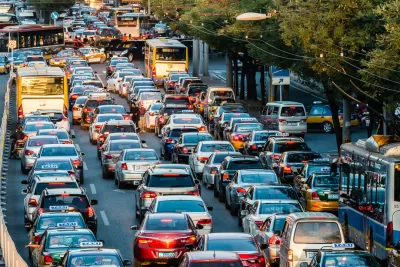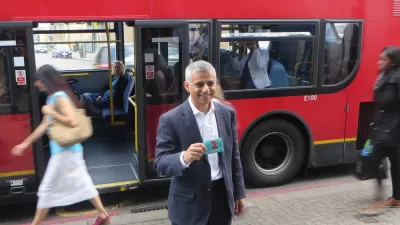Vehicle pollution is making cities around the world unlivable. Some cities have taken steps to curb auto use and emissions, with varying levels of success.

"At a time when most of humanity lives in cities, where do cars belong — especially the old, polluting ones that make city air foul for people to breathe?" ask Somini Sengupta and Nadja Popovich. They examine the efforts in a number of cities to limit and regulate driving as well as what has motivated particular strategies and the outcomes of policy measures.
London was an early adopter of congestion pricing, and the city added additional charges this year in an Ultra Low Emission Zone, which it plans to expand in 2021. "By October 2019, nitrogen dioxide levels in the air had declined by 36 percent compared to February 2017, according to an assessment by the city," note Sengupta and Popovich.
Beijing and New Delhi are two cities that have continued to struggle with poor air quality. Beijing instituted a license plate lottery, among other strategies, and pollution has decreased. "But, the city’s air quality still fails to meet national standards for fine particulate pollution and far exceeds levels the World Health Organization deems safe to breathe," say Sengupta and Popovich.
In New Delhi, measures to address pollution have been hindered by the large increase in the number of motorcycles, cars, and trucks that are belching out emissions, and air quality remains at hazardous levels.
Madrid has faced different roadblocks—namely, political maneuvering playing out around a ban on cars in the city center. Even with measured improvements in air quality, conservatives sought, unsuccessfully, to lift the ban. "The Spanish capital is in the throes of a heated debate about what kind of a city it wants to be, and cars are at the heart of it," write Sengupta and Popovich.
FULL STORY: Cities Worldwide Are Reimagining Their Relationship With Cars

Planetizen Federal Action Tracker
A weekly monitor of how Trump’s orders and actions are impacting planners and planning in America.

Restaurant Patios Were a Pandemic Win — Why Were They so Hard to Keep?
Social distancing requirements and changes in travel patterns prompted cities to pilot new uses for street and sidewalk space. Then it got complicated.

Map: Where Senate Republicans Want to Sell Your Public Lands
For public land advocates, the Senate Republicans’ proposal to sell millions of acres of public land in the West is “the biggest fight of their careers.”

Maui's Vacation Rental Debate Turns Ugly
Verbal attacks, misinformation campaigns and fistfights plague a high-stakes debate to convert thousands of vacation rentals into long-term housing.

San Francisco Suspends Traffic Calming Amidst Record Deaths
Citing “a challenging fiscal landscape,” the city will cease the program on the heels of 42 traffic deaths, including 24 pedestrians.

California Homeless Arrests, Citations Spike After Ruling
An investigation reveals that anti-homeless actions increased up to 500% after Grants Pass v. Johnson — even in cities claiming no policy change.
Urban Design for Planners 1: Software Tools
This six-course series explores essential urban design concepts using open source software and equips planners with the tools they need to participate fully in the urban design process.
Planning for Universal Design
Learn the tools for implementing Universal Design in planning regulations.
Heyer Gruel & Associates PA
JM Goldson LLC
Custer County Colorado
City of Camden Redevelopment Agency
City of Astoria
Transportation Research & Education Center (TREC) at Portland State University
Camden Redevelopment Agency
City of Claremont
Municipality of Princeton (NJ)





























